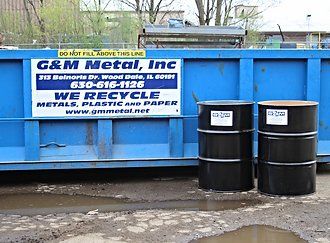When it comes to getting rid of unwanted items, scrap metal often finds itself in the limelight. From old appliances to worn-out car parts, disposing of scrap metal might seem straightforward, but there’s more to it than meets the eye.
In this guide, we will unravel the basics of scrap metal disposal, shedding light on the importance of responsible recycling.
1. Understand Your Scrap Metal Types
Not all scrap metal is created equal. There are two main categories: ferrous and non-ferrous. Ferrous metals, such as iron and steel, contain iron, while non-ferrous metals, like aluminum and copper, lack iron.
Knowing the type of metal, you’re dealing with is crucial, as recycling centers often separate and process them differently. If you’re uncertain, a quick check with a magnet can help – ferrous metals stick, non-ferrous don’t.
2. Separate Your Scrap Metal
Efficient disposal begins with proper separation. Before taking your scrap metal to a recycling center, sort it into ferrous and non-ferrous categories. This not only streamlines the recycling process but also ensures you get the best value for your efforts.
Many recycling centers appreciate customers who take the time to organize their scrap metal, making the overall recycling experience smoother. Metal recycling isn’t just about dropping off your items; it’s about supporting local efforts.
For example, if you find yourself in Schaumburg, IL, a quick search for metal recycling schaumburg il can lead you to centers dedicated to responsible recycling practices.
3. Consider Environmental Impact
While it might be tempting to discard scrap metal with regular household waste, taking the extra step to recycle has significant environmental benefits. Recycling metal reduces the need for new raw materials, conserving natural resources and energy.
It also minimizes the environmental impact of mining and processing metals. By choosing recycling centers that adhere to eco-friendly practices, you contribute to a healthier planet.
Similarly, if you’re in Oakland, CA, exploring options like metal recycling center oakland ca can guide you to facilities that prioritize environmental sustainability.
4. Learn About Scrap Metal Prices
Understanding the market value of your scrap metal is crucial. Prices can vary based on factors such as metal type, quantity, and market demand. Before heading to a recycling center, check the latest scrap metal prices to ensure you receive fair compensation for your efforts.
While prices fluctuate, staying informed helps you make informed decisions about when to recycle and when to hold off for better returns.
Conclusion: A Greener Tomorrow Starts with Responsible Scrap Metal Disposal
Disposing of unwanted scrap metal is more than just clearing out clutter – it’s a contribution to a sustainable future. By familiarizing yourself with the basics, separating your metals, and choosing local recycling centers, you play a crucial role in reducing the environmental impact of metal production.
Together, we can transform the seemingly mundane act of scrap metal disposal into a powerful force for positive change, creating a greener tomorrow for generations to come.

